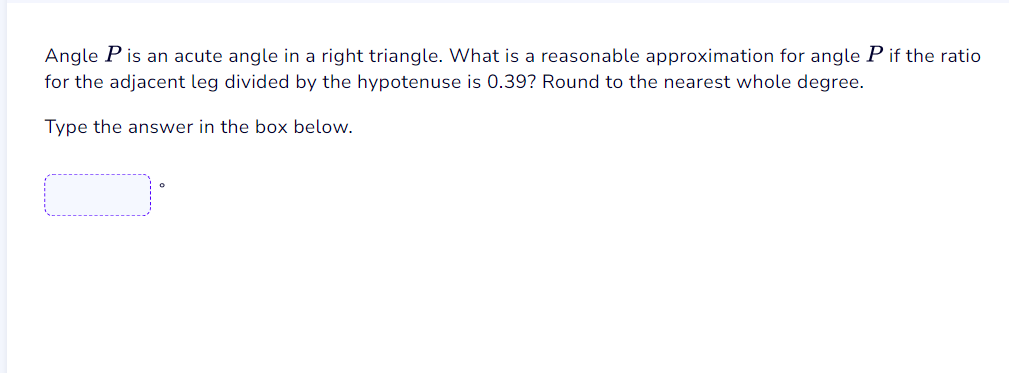Angle P is an acute angle in a right triangle. What is a reasonable approximation for angle P if the ratio for the adjacent leg divided by the hypotenuse is 0.39? Round to the near... Angle P is an acute angle in a right triangle. What is a reasonable approximation for angle P if the ratio for the adjacent leg divided by the hypotenuse is 0.39? Round to the nearest whole degree.

Understand the Problem
The question is asking us to determine the angle P in a right triangle when given the ratio of the adjacent leg to the hypotenuse as 0.39. We will use trigonometric functions to find the angle and round it to the nearest whole degree.
Answer
$66^\circ$
Answer for screen readers
The final answer is approximately $66^\circ$.
Steps to Solve
-
Identify the trigonometric ratio The problem states that the ratio of the adjacent leg to the hypotenuse is 0.39. This represents the cosine of angle $P$. Therefore, we can express this relationship as: $$ \cos(P) = 0.39 $$
-
Use the inverse cosine function To find angle $P$, we will use the inverse cosine function (arccos). This means we can calculate $P$ as follows: $$ P = \cos^{-1}(0.39) $$
-
Calculate the angle in degrees Using a calculator, compute the value: $$ P \approx \cos^{-1}(0.39) $$
-
Round to the nearest whole degree After computing the angle, round the result to the nearest whole number.
The final answer is approximately $66^\circ$.
More Information
The cosine function is typically used in right triangles whenever you know the lengths of the adjacent side and the hypotenuse. The inverse cosine function helps us determine the angles based on these ratios.
Tips
- Miscalculating the inverse cosine value: Ensure the calculator is in the correct mode (degrees) before performing the calculation.
- Forgetting to round the result to the nearest whole number: Always check to ensure rounding is done correctly.
AI-generated content may contain errors. Please verify critical information